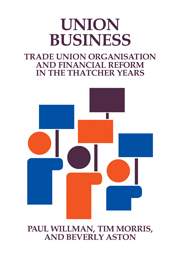Book contents
- Frontmatter
- Contents
- Acknowledgements
- 1 Introduction: unions in the 1980s
- 2 The financial status of British trade unions 1950–1989
- 3 Financial differences between unions
- 4 The role of financial matters in union organisation
- 5 The politics of union finaces
- 6 Union size, growth, and financial performance
- 7 Strike activity and union finances
- 8 The National Union of Mineworkers: strikes and financial disaster
- 9 The GMB: merger and financial reform
- 10 The Amalgamated Engineering Union: back from the brink
- 11 The Banking, Insurance and Finance Union: competitive unionism and financial survival
- 12 The Electrical, Electronic, Telecommunications and Plumbing Trade Union: accountability and financial control
- 13 Conclusions: union business and business unionism
- Appendix 1 Research methods
- Appendix 2 Regression results
- Appendix 3 Questions for finance officers
- Appendix 4 Questions for General Secretaries
- Appendix 5 Questionnaire: trade union finances
- Appendix 6 The number of trade unions
- Notes
- References
- Subject index
- Index of trade unions
- Author index
5 - The politics of union finaces
Published online by Cambridge University Press: 11 March 2010
- Frontmatter
- Contents
- Acknowledgements
- 1 Introduction: unions in the 1980s
- 2 The financial status of British trade unions 1950–1989
- 3 Financial differences between unions
- 4 The role of financial matters in union organisation
- 5 The politics of union finaces
- 6 Union size, growth, and financial performance
- 7 Strike activity and union finances
- 8 The National Union of Mineworkers: strikes and financial disaster
- 9 The GMB: merger and financial reform
- 10 The Amalgamated Engineering Union: back from the brink
- 11 The Banking, Insurance and Finance Union: competitive unionism and financial survival
- 12 The Electrical, Electronic, Telecommunications and Plumbing Trade Union: accountability and financial control
- 13 Conclusions: union business and business unionism
- Appendix 1 Research methods
- Appendix 2 Regression results
- Appendix 3 Questions for finance officers
- Appendix 4 Questions for General Secretaries
- Appendix 5 Questionnaire: trade union finances
- Appendix 6 The number of trade unions
- Notes
- References
- Subject index
- Index of trade unions
- Author index
Summary
Introduction
Since unions are not profit-making institutions, since the extent of managerial discretion is normally limited by ostensibly democratic government structures, and since, at least in some unions, commercial arguments are held in very low esteem, financial managers must tread carefully. Certain types of commercial argument are simply not publicly available and there is no clear maximand which might indicate good or bad financial management in the short term.
The management of finances, which, as Roberts (1956) noted, is central to the control of union activity overall is essentially contestable. The influence wielded by those responsible for financial affairs compared with that wielded by other interest groups within the union is thus important. So too is the rule book. As we noted above, public debate on financial matters will be conducted within a vocabulary of motives in which avowal of arguments about financial matters can only be justified by reference to members' interests. This vocabulary may be considered as the set of publicly available arguments about the management of the union.
In this chapter, we shall examine both the pattern of financial management in trade unions and the nature of debate over financial matters. In the first instance, we shall use questionnaire data. For examination of the debates we shall use material from the case studies.
The pattern of financial management
The rationale for the questionnaire and the overall response rate stratified by size are discussed in Appendix 1. In all, 72 questionnaires were returned, 46% from TUC affiliates and 54% from non-affiliates. The sample included craft, general, industry, white-collar, and occupational unions as well as staff associations based on a single company.
- Type
- Chapter
- Information
- Union BusinessTrade Union Organisation and Financial Reform in the Thatcher Years, pp. 55 - 78Publisher: Cambridge University PressPrint publication year: 1993



